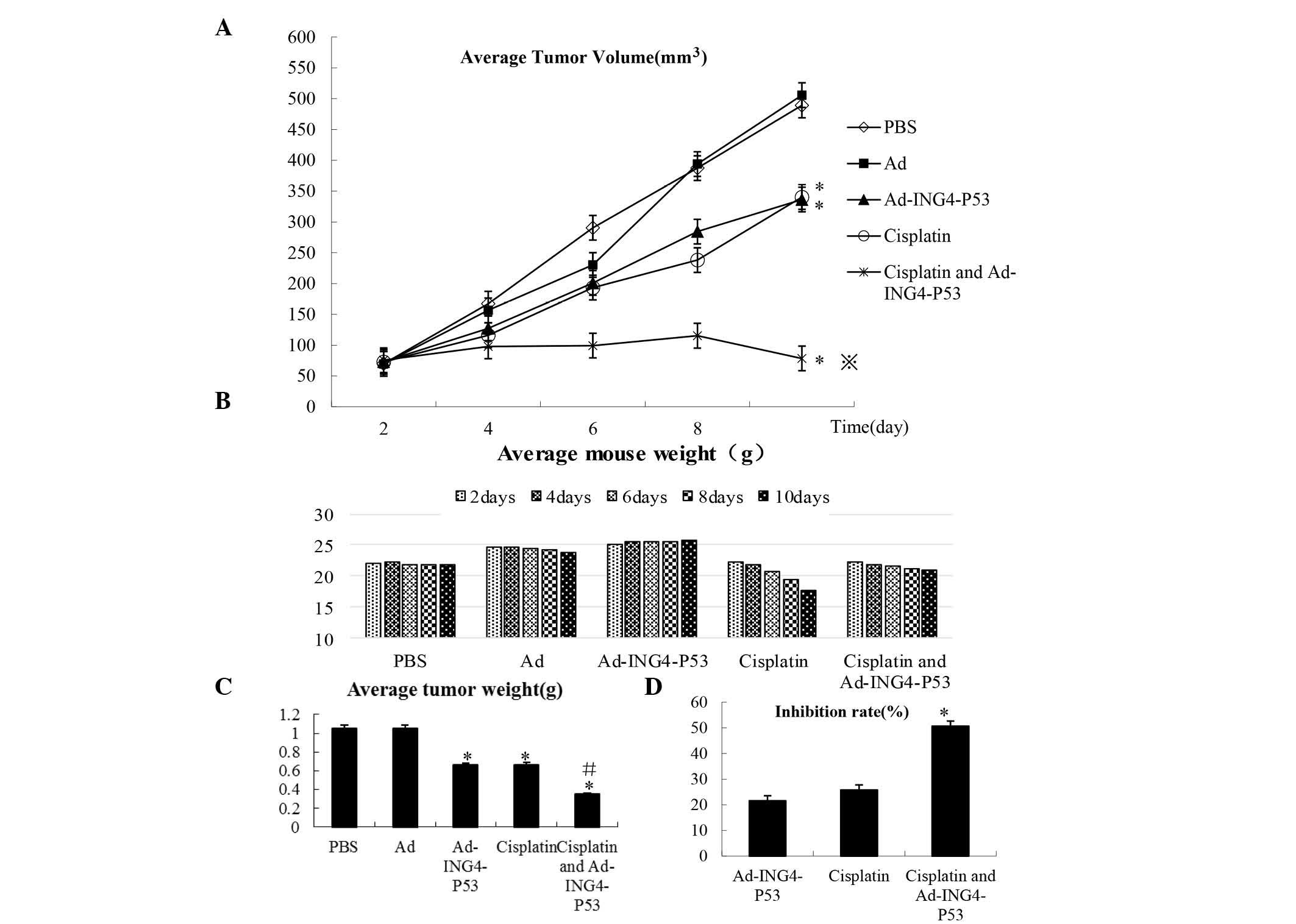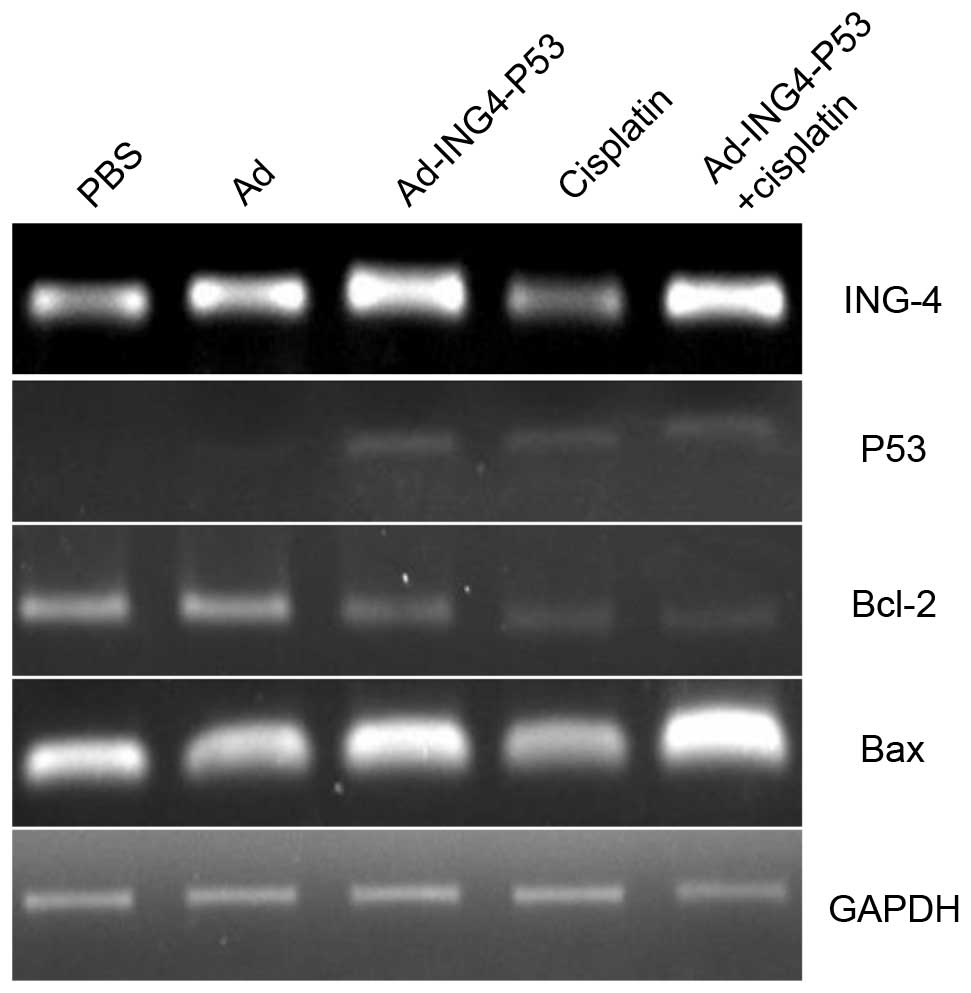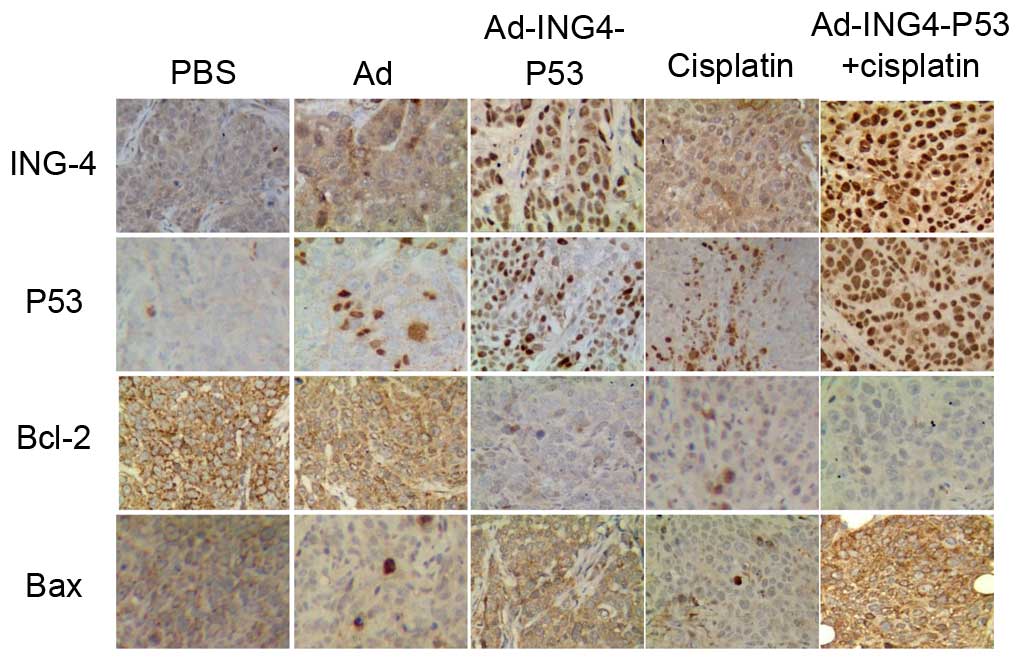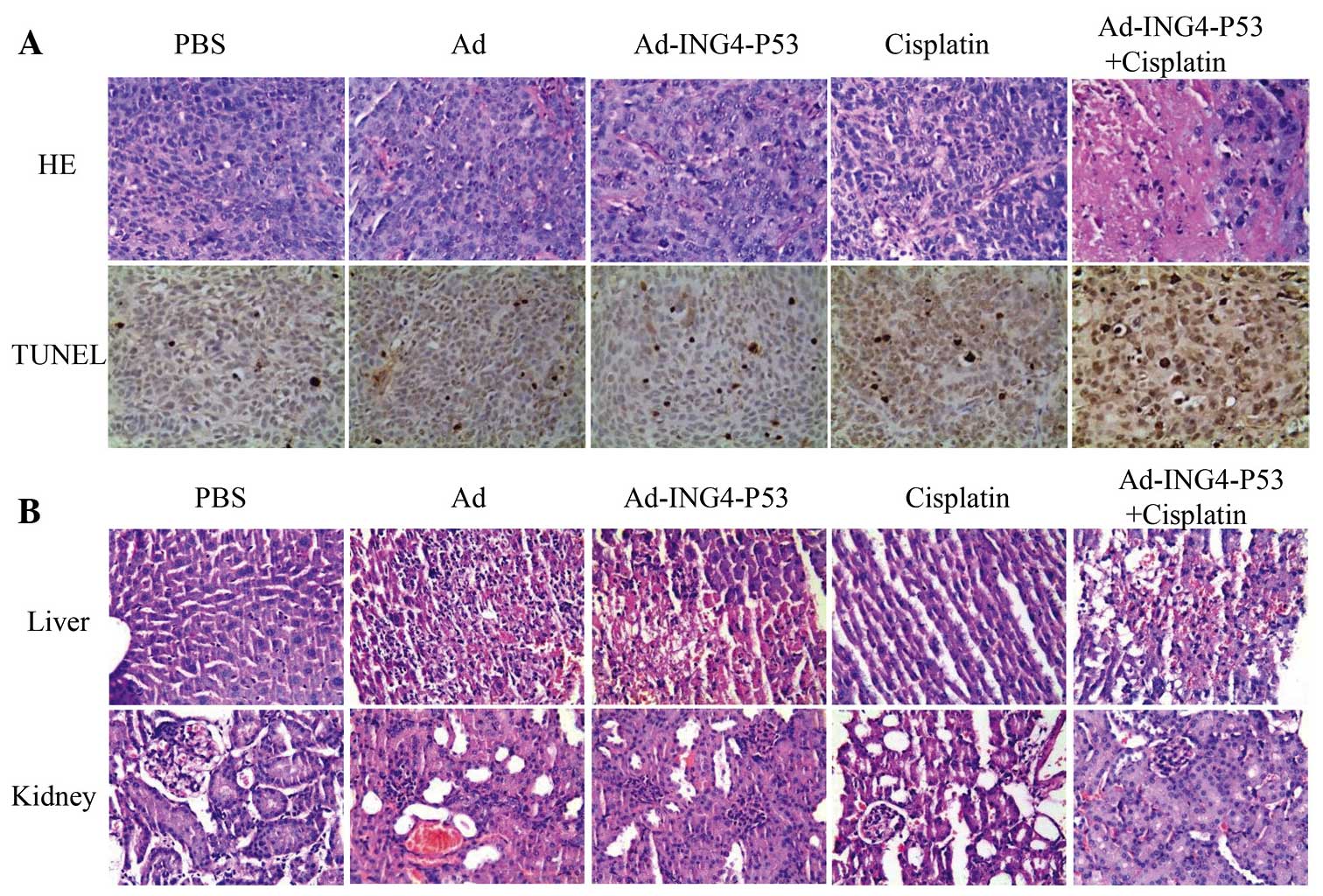|
1
|
Genden EM, Ferlito A, Bradley PJ, Rinaldo
A and Scully C: Neck disease and distant metastases. Oral Oncol.
39:207–212. 2003. View Article : Google Scholar : PubMed/NCBI
|
|
2
|
Torre LA, Bray F, Siegel RL, Ferlay J,
Lortet-Tieulent J and Jemal A: Global cancer statistics, 2012. CA
Cancer J Clin. 65:87–108. 2015. View Article : Google Scholar : PubMed/NCBI
|
|
3
|
Keereweer S, Kerrebijn JD, Al-Mamgani A,
Sewnaik A, Baatenburg de Jong RJ and van Meerten E: Chemoradiation
for advanced hypopharyngeal carcinoma: A retrospective study on
efficacy, morbidity and quality of life. Eur Arch Otorhinolaryngol.
269:939–946. 2012. View Article : Google Scholar :
|
|
4
|
Hanna NN, Mauceri HJ, Wayne JD, Hallahan
DE, Kufe DW and Weichselbaum RR: Virally directed cytosine
deaminase/5-fluo-rocytosine gene therapy enhances radiation
response in human cancer xenografts. Cancer Res. 57:4205–4209.
1997.PubMed/NCBI
|
|
5
|
Thurfjell N, Coates PJ, Boldrup L,
Lindgren B, Bäcklund B, Uusitalo T, Mahani D, Dabelsteen E,
Dahlqvist A, Sjöström B, et al: Function and importance of p63 in
normal oral mucosa and squamous cell carcinoma of the head and
neck. Adv Otorhinolaryngol. 62:49–57. 2005.
|
|
6
|
Luo XR, Li JS, Niu Y and Miao L:
Adenovirus-mediated double suicide gene selectively kills gastric
cancer cells. Asian Pac J Cancer Prev. 13:781–784. 2012. View Article : Google Scholar : PubMed/NCBI
|
|
7
|
Shiseki M, Nagashima M, Pedeux RM,
Kitahama-Shiseki M, Miura K, Okamura S, Onogi H, Higashimoto Y,
Appella E, Yokota J and Harris CC: p29ING4 and p28ING5 bind to p53
and p300, and enhance p53 activity. Cancer Res. 63:2373–2378.
2003.PubMed/NCBI
|
|
8
|
Garkavtsev I, Kozin SV, Chernova O, Xu L,
Winkler F, Brown E, Barnett GH and Jain RK: The candidate tumour
suppressor protein ING4 regulates brain tumour growth and
angiogenesis. Nature. 428:328–332. 2004. View Article : Google Scholar : PubMed/NCBI
|
|
9
|
Unoki M, Shen JC, Zheng ZM and Harris CC:
Novel splice variants of ING4 and their possible roles in the
regulation of cell growth and motility. J Biol Chem.
281:34677–34686. 2006. View Article : Google Scholar : PubMed/NCBI
|
|
10
|
Colla S, Tagliaferri S, Morandi F, Lunghi
P, Donofrio G, Martorana D, Mancini C, Lazzaretti M, Mazzera L,
Ravanetti L, et al: The new tumor-suppressor gene inhibitor of
growth family member 4 (ING4) regulates the production of
proangiogenic molecules by myeloma cells and suppresses
hypoxia-inducible factor-1 alpha (HIF-1alpha) activity: Involvement
in myeloma-induced angio-genesis. Blood. 110:4464–4475. 2007.
View Article : Google Scholar : PubMed/NCBI
|
|
11
|
Shen JC, Unoki M, Ythier D, Duperray A,
Varticovski L, Kumamoto K, Pedeux R and Harris CC: Inhibitor of
growth 4 suppresses cell spreading and cell migration by
interacting with a novel binding partner, liprin alpha1. Cancer
Res. 67:2552–2558. 2007. View Article : Google Scholar : PubMed/NCBI
|
|
12
|
Li J, Martinka M and Li G: Role of ING4 in
human melanoma cell migration, invasion and patient survival.
Carcinogenesis. 29:1373–1379. 2008. View Article : Google Scholar : PubMed/NCBI
|
|
13
|
Cai L, Li X, Zheng S, Wang Y, Wang Y, Li
H, Yang J and Sun J: Inhibitor of growth 4 is involved in
melanomagenesis and induces growth suppression and apoptosis in
melanoma cell line M14. Melanoma Res. 19:1–7. 2009. View Article : Google Scholar : PubMed/NCBI
|
|
14
|
Wei Q, He W, Lu Y, Yao J and Cao X: Effect
of the tumor suppressor gene ING4 on the proliferation of MCF-7
human breast cancer cells. Oncol Lett. 4:438–442. 2012.PubMed/NCBI
|
|
15
|
Huang J, Yang J, Ling C, Zhao D, Xie Y and
You Z: The mechanism of inhibition effect of adenovirus-mediated
ING4 on human lung adenocarcinoma xenografts in nude mice. Zhongguo
Fei Ai Za Zhi. 17:142–147. 2014.In Chinese. PubMed/NCBI
|
|
16
|
Xu M, Xie Y, Sheng W, Miao J and Yang J:
Adenovirus-mediated ING4 gene transfer in osteosarcoma suppresses
tumor growth via induction of apoptosis and inhibition of tumor
angiogenesis. Technol Cancer Res Treat. 14:369–378. 2015.
View Article : Google Scholar
|
|
17
|
Gunduz M, Nagatsuka H, Demircan K, Gunduz
E, Cengiz B, Ouchida M, Tsujigiwa H, Yamachika E, Fukushima K,
Beder L, et al: Frequent deletion and down-regulation of ING4, a
candidate tumor suppressor gene at 12p13, in head and neck squamous
cell carcinomas. Gene. 356:109–117. 2005. View Article : Google Scholar : PubMed/NCBI
|
|
18
|
Vijayaraman KP, Veluchamy M, Murugesan P,
Shanmugiah KP and Kasi PD: p53 exon 4 (codon 72) polymorphism and
exon 7 (codon 249) mutation in breast cancer patients in southern
region (Madurai) of Tamil Nadu. Asian Pac J Cancer Prev.
13:511–516. 2012. View Article : Google Scholar : PubMed/NCBI
|
|
19
|
Levine AJ, Finlay CA and Hinds PW: P53 is
a tumor suppressor gene. Cell. 116(Suppl 2): S67–S69, 1 p following
S69. 2004. View Article : Google Scholar : PubMed/NCBI
|
|
20
|
Yu M, Chen W and Zhang J: p53 gene therapy
for pulmonary metastasis tumor from hepatocellular carcinoma.
Anticancer Drugs. 21:882–884. 2010. View Article : Google Scholar : PubMed/NCBI
|
|
21
|
Oshima Y, Sasaki Y, Negishi H, Idogawa M,
Toyota M, Yamashita T, Wada T, Nagoya S, Kawaguchi S, Yamashita T
and Tokino T: Antitumor effect of adenovirus-mediated p53 family
gene transfer on osteosarcoma cell lines. Cancer Biol Ther.
6:1058–1066. 2007. View Article : Google Scholar : PubMed/NCBI
|
|
22
|
Russell M, Berardi P, Gong W and Riabowol
K: Grow-ING, Age-ING and Die-ING: ING proteins link cancer,
senescence and apoptosis. Exp Cell Res. 312:951–961. 2006.
View Article : Google Scholar : PubMed/NCBI
|
|
23
|
Soliman MA and Riabowol K: After a decade
of study-ING, a PHD for a versatile family of proteins. Trends
Biochem Sci. 32:509–519. 2007. View Article : Google Scholar : PubMed/NCBI
|
|
24
|
Sozzi G, Miozzo M, Donghi R, Pilotti S,
Cariani CT, Pastorino U, Della Porta G and Pierotti MA: Deletions
of 17p and p53 mutations in preneoplastic lesions of the lung.
Cancer Res. 52:6079–6082. 1992.PubMed/NCBI
|
|
25
|
Jin ZJ: Addition in drug combination
(author's transl). Zhongguo Yao Li Xue Bao. 1:70–76. 1980.In
Chinese. PubMed/NCBI
|
|
26
|
Yin W, Zhang J, Jiang Y and Juan S:
Combination therapy with low molecular weight heparin and
Adriamycin results in decreased breast cancer cell metastasis in CH
mice. Exp Ther Med. 8:1213–1218. 2014.PubMed/NCBI
|
|
27
|
Chan DA, Sutphin PD, Nguyen P, Turcotte S,
Lai EW, Banh A, Reynolds GE, Chi JT, Wu J, Solow-Cordero DE, et al:
Targeting GLUT1 and the Warburg effect in renal cell carcinoma by
chemical synthetic lethality. Sci Transl Med. 3:94ra702011.
View Article : Google Scholar : PubMed/NCBI
|
|
28
|
Shimanishi M, Ogi K, Sogabe Y, Kaneko T,
Dehari H, Miyazaki A and Hiratsuka H: Silencing of GLUT-1 inhibits
sensitization of oral cancer cells to cisplatin during hypoxia. J
Oral Pathol Med. 42:382–388. 2013. View Article : Google Scholar
|
|
29
|
Wang YD, Li SJ and Liao JX: Inhibition of
glucose transporter 1 (GLUT1) chemosensitized head and neck cancer
cells to cisplatin. Technol Cancer Res Treat. 12:525–535.
2013.PubMed/NCBI
|
|
30
|
Zhang X, Xu LS, Wang ZQ, Wang KS, Li N,
Cheng ZH, Huang SZ, Wei DZ and Han ZG: ING4 induces G2/M cell cycle
arrest and enhances the chemosensitivity to DNA-damage agents in
HepG2 cells. FEBS Lett. 570:7–12. 2004. View Article : Google Scholar : PubMed/NCBI
|
|
31
|
Zhou X, Gu Y and Zhang SL: Association
between p53 codon 72 polymorphism and cervical cancer risk among
Asians: A HuGE review and meta-analysis. Asian Pac J Cancer Prev.
13:4909–4914. 2012. View Article : Google Scholar : PubMed/NCBI
|
|
32
|
Kraljević Pavelić S, Marjanović M, Poznić
M and Kralj M: Adeno-virally mediated p53 overexpression diversely
influence the cell cycle of HEp-2 and CAL 27 cell lines upon
cisplatin and methotrexate treatment. J Cancer Res Clin Oncol.
135:1747–1761. 2009. View Article : Google Scholar
|
|
33
|
Rudin CM and Thompson CB: Apoptosis and
disease: Regulation and clinical relevance of programmed cell
death. Ann Rev Med. 48:267–281. 1997. View Article : Google Scholar : PubMed/NCBI
|
|
34
|
Tse C, Shoemaker AR, Adickes J, Anderson
MG, Chen J, Jin S, Johnson EF, Marsh KC, Mitten MJ, Nimmer P, et
al: ABT-263: A potent and orally bioavailable Bcl-2 family
inhibitor. Cancer Res. 68:3421–3428. 2008. View Article : Google Scholar : PubMed/NCBI
|
|
35
|
Cosulich SC, Savory PJ and Clarke PR:
Bcl-2 regulates amplification of caspase activation by cytochrome
c. Curr Biol. 9:147–150. 1999. View Article : Google Scholar : PubMed/NCBI
|
|
36
|
Lozier JN, Csako G, Mondoro TH, Krizek DM,
Metzger ME, Costello R, Vostal JG, Rick ME, Donahue RE and Morgan
RA: Toxicity of a first-generation adenoviral vector in rhesus
macaques. Hum Gene Ther. 13:113–124. 2002. View Article : Google Scholar : PubMed/NCBI
|
|
37
|
Li Y, Shao JY, Liu RY, Zhou L, Chai LP, Li
HL, Han HY, Huang BJ, Zeng MS, Zhu XF, et al: Evaluation of
long-term toxicity of Ad/hIFN-, an Adenoviral vector encoding the
human interferon-gamma gene, in nonhuman primates. Hum Gene Ther.
19:827–839. 2008. View Article : Google Scholar : PubMed/NCBI
|
|
38
|
Haisma HJ, Boesjes M, Beerens AM, van der
Strate BW, Curiel DT, Plüddemann A, Gordon S and Bellu AR:
Scavenger receptor A: A new route for adenovirus 5. Mol Pharm.
6:366–374. 2009. View Article : Google Scholar : PubMed/NCBI
|
|
39
|
Lieber A, He CY, Meuse L, Schowalter D,
Kirillova I, Winther B and Kay MA: The role of Kupffer cell
activation and viral gene expression in early liver toxicity after
infusion of recombinant adenovirus vectors. J Virol. 71:8798–8807.
1997.PubMed/NCBI
|
|
40
|
Zhu Y, Lv H, Xie Y, Sheng W, Xiang J and
Yang J: Enhanced tumor suppression by an ING4/IL-24 bicistronic
adenovirus-mediated gene cotransfer in human non-small cell lung
cancer cells. Cancer Gene Ther. 18:627–636. 2011. View Article : Google Scholar : PubMed/NCBI
|


















